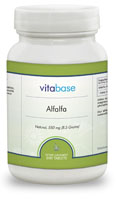| |
Alfalfa |
|
| Alfalfa is a genus of perennial flowering plant, Medicago, most commonly referring to M. sativa L., also called lucerne. Alfalfa is one of the world's most important forage plants. Alfalfa is a perennial herbaceous legume that grows from a semiwoody base or crown. The crown sends up many thin, but succulent, leafy multibranched stems 2 to 4 feet high, each stem terminates in a raceme or cluster of 10 to 100 purple, white, or greenish-yellow florets. It is widely cultivated and is increasing in popularity for human consumption due to its promotion as a dietary supplement. |
| |
Active constituents |
|
| Because of its deep root system, alfalfa is better able to absorb minerals from the soil than other plants. Therefore, alfalfa is a rich source of vitamins and minerals, as well as chlorophyll. Alfalfa is rich in saponins, numerous vitamins and minerals including vitamin A, vitamin B1, vitamin B6, vitamin C, vitamin E, and vitamin K, niacin, biotin, folic acid, calcium, potassium, phosphorus, magnesium, and zinc. Alfalfa contains dozens of amino acids. Alfalfa is also higher in protein than many other plant foods, yielding 15 to 25 percent protein in dried alfalfa meal. Alfalfa leaves also contain flavones, isoflavones, sterols, and coumarin derivatives. |
| |
Claimed uses and health benefits alfalfa |
|
|
Many people advocate the use of dried alfalfa and alfalfa sprouts to enhance health. Alfalfa is used as to treat arthritis, diabetes, digestive problems, weight loss, ulcers, kidney and bladder problems, prostate conditions, asthma, and hay fever. Alfalfa facilitates efficient ingestion of the entire nutriments present in alfalfa without waste. Bean sprouts of alfalfa are well known as preferable food plant due to their main components of fibers and vitamins which are said good for the human body. Alfalfa leaf saponins have been shown to lower plasma cholesterol, decrease intestinal absorption of cholesterol, and prevent atherosclerosis. Due to its generally high nutritive value, alfalfa could possibly help to prevent fatigue associated with vitamin/mineral deficiency or protein energy malnutrition in disadvantaged parts of the world. The antibacterial, antioxidant and antifungal properties of alfalfa provide relief from arthritis pain and aid in healing intestinal ulcers, gastritis, liver disorders and cancer. In China, alfalfa has been used for digestive problems for thousands of years. In China, alfalfa, or zi mu, and a closely related species tooth-bur clover, Medicago hispida or nan mu xu have been used since the sixth century. Traditional Chinese healers use alfalfa leaves to cleanse the digestive system and to rid the bladder of stones. The root of alfalfa is used in Chinese medicine to reduce fever, improve urine flow, and treat jaundice, kidney stones , and night blindness. In traditional Chinese medicine, juice squeezed from fresh alfalfa is used to treat kidney and bladder stones. To treat fluid retention, alfalfa leaves are added to a soup along with bean curd and lard. |
| |
Dosages and recommended daily intakes |
|
| Dried alfalfa leaf is available as a bulk herb, and in tablets or capsules. It is also available in liquid extracts. No therapeutic amount of alfalfa has been established for humans. Typical dosage recommendations for alfalfa for lowering cholesterol levels range from 250-1000mg, taken 2-3 times daily with meals. Although alfalfa is available as fresh or dried leaf, it is most often taken as a capsule of powdered alfalfa or as a tablet. When dried leaves are used, steeping one ounce of dried leaves in one pint of water for up to 20 minutes makes a tea. Two cups of this tea are drunk daily. |
| |
Alfalfa side effects, toxicity, interactions, precautions |
|
| Alfalfa is generally safe when taken by healthy individuals. There have been isolated reports of people who are allergic to alfalfa. On occasion, alfalfa sprouts have been contaminated with Salmonella and E. coli and have been responsible for outbreaks of diarrheal disease and hemolytic uremic syndrome (HUS), a disease associated with E. coli. Use of alfalfa has been associated with lupuslike effects, such as antinuclear antibodies in the blood, muscle pains, fatigue, abnormal immune system function and kidney problems. People with the autoimmune disease systemic lupus erythematosus (SLE) should not take any form of alfalfa. Alfalfa may interfere with diabetes agents, estrogen, water pills, and immune-suppressing drugs. |
|
|
|
|
